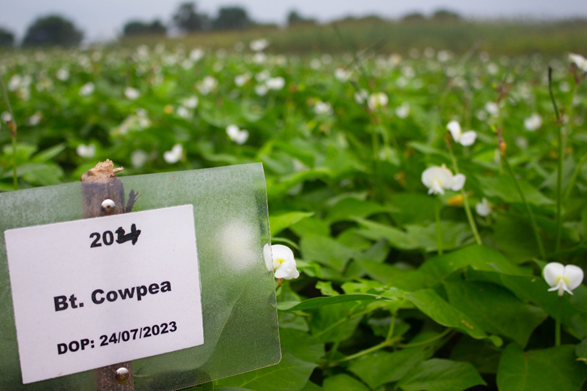
(Abuja: October 25, 2024) A new study has confirmed that cultivating transgenic Pod Borer Resistant (PBR) Cowpea does not harm ecological species or disrupt biodiversity. Contrary to concerns raised by anti-technology groups, the study suggests that PBR Cowpea can have a positive effect on the environment.
The research, titled Biodiversity Assessment and Environmental Risk Analysis of the Single Line Transgenic Pod Borer Resistant Cowpea, aimed to evaluate the environmental safety of PBR Cowpea by comparing its impact on biodiversity with that of its non-transgenic counterpart, IT97KN. The findings are intended to provide critical data to address public concerns about the safety of transgenic crops.
Published in the October edition of PeerJ Ecology, the study noted that “all species and families observed during this study were more abundant in transgenic PBR Cowpea fields than in non-transgenic cowpea fields, suggesting that the transformation of cowpea does not negatively impact non-target organisms and their communities.”
Furthermore, the study showed that the dynamics of species communities in both transgenic and non-transgenic fields were consistent throughout the research period, with no significant differences in community structure caused by the introduction of PBR Cowpea.
Authored by Dr. Francis Onyekachi and colleagues, the study highlights the significance of understanding biological diversity, especially following the introduction of Nigeria’s first transgenic food crop, the pod borer-resistant cowpea. The researchers acknowledged the ongoing debate surrounding the potential risks of transgenic Maruca vitrata-resistant cowpea to human health and beneficial insects. Despite persistent concerns and calls from social activists to ban the crop, the study emphasizes the lack of data supporting claims that PBR Cowpea cultivation adversely affects biodiversity or the broader ecological system.
For the study, seeds of both the transgenic PBR Cowpea and its isoline were obtained from the Institute for Agricultural Research (IAR), Zaria. Both types of cowpeas were cultivated at multiple farm sites, following local cultural practices. Researchers used detailed taxonomic keys to identify arthropods and other non-target species during the experiment.
Analyses of species evenness and diversity indices revealed no significant differences between fields of transgenic PBR Cowpea and its non-transgenic counterpart, indicating that PBR Cowpea is environmentally safe for cultivation.
Dr Onyekachi, who is also AATF Stewardship Manager said that the study was to among other things correct the misinformation that PBR Cowpea endanger ecological species and to also demonstrate that the variety is safe for the animals. environment and humans.
About AATF (www.aatf-africa.org)
Founded in 2003 to address Africa’s food security prospects through agricultural technology, AATF believes that the agricultural sector is a key foundational pillar as Africa consolidates its economic growth and carves out its new position as a major global economic powerhouse and the next growth market in the world. It was formed in response to the need for an effective mechanism that would facilitate and support negotiation for technology access and delivery and the formation of appropriate partnerships to manage the development & deployment of innovative technologies for use by smallholder farmers in SSA:
For further information. Photos and video contact:
Alex Abutu Communication Officer (West and Central Africa) AATF.
+2348068701960 a.abutu@aatf-africa.org


















































































